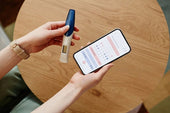How to Find the Best Period Tracker App for Your Health?
Period tracking isn't just about noting when your period starts and ends. For many women, period tracking is a vital tool for understanding their bodies, keeping track of overall reproductive health, and even planning or avoiding pregnancy.
In today's digital age, apps have made this process straightforward, accessible, and highly personalized. However, with so many options available, it can be confusing for any woman trying to choose the best period app. In such a case, the most common question that arises is, what is the best period tracker app?
To use any period tracker or find the best one, you first need to understand your cycle, as these apps require certain information about your cycle to accurately predict your periods. You need to understand the difference between normal and abnormal variations in your cycle to better track your periods.
What Defines a Normal or Average Menstrual Cycle?
A normal menstrual cycle can vary widely among women, but there are some general benchmarks that health experts use as a reference. Typically, a menstrual cycle lasts between 21 and 35 days [1].
The "day one" of your cycle is considered the first day of your period, and the cycle continues until the start of your next period. The average cycle is about 28 days, though different variations in cycle length are normal [1]. Factors such as age, weight, stress, and overall health can shift this number slightly.
For more insights on managing your cycle, consider exploring "How to Track Ovulation With Irregular Periods: Empowering Your Fertility Journey" where you can learn practical methods on how to track ovulation with irregular periods.
Components of a Normal Cycle
The female menstrual cycle involves four major components or events that determine if the cycle is normal or not. These components include:
- Menstrual Phase: Menstrual phase, also known as periods, is the start of the menstrual cycle when the uterine lining sheds and bleeding occurs. This phase lasts between 4 and 7 days, depending on the individual's cycle length.
- Follicular Phase: This phase overlaps with menstruation at the beginning and continues until ovulation starts. In an average cycle of 28 days, the follicular phase lasts from day 1 to day 13. The follicular phase in the cycle is when your body prepares an egg for ovulation.
- Ovulation: Approximately mid-cycle, ovulation occurs when an egg is released from the ovary [2]. This is the most fertile period and is critical for anyone tracking their cycle for pregnancy purposes.
- Luteal Phase: The luteal phase begins after ovulation when the body starts preparing for potential pregnancy. This phase continues until the body either confirms pregnancy or resets by initiating the next menstrual phase.
Image Source: https://www.invitra.com/en/phases-of-the-menstrual-cycle/menstrual-cycle-phases/
How Period Variations Can Occur?
No two cycles are exactly alike, and many factors can cause fluctuations in a woman's menstrual cycle. These variations can be confusing, but many times, they are a normal part of the cycle. Here are a few common reasons your cycle might differ from the average:
-
Stress and Lifestyle Changes
A natural balance of different hormones regulate the different phases of the menstrual cycle. High stress levels can disrupt this hormonal balance and increase the risk of irregular periods [3].
Changes in diet, lack of sleep, and high levels of physical or emotional stress can all contribute to shorter or longer cycles. If you find that your cycle becomes irregular during stressful times, it might just be your body's natural response to stress.
-
Hormonal Imbalances
Hormonal fluctuations, which can occur due to natural changes like puberty, perimenopause, or conditions such as polycystic ovary syndrome (PCOS), can also affect the regularity of your cycle. Such hormonal fluctuations can lead to variations in cycle length, heavy bleeding, or even skipped periods.
-
Certain Medical Conditions and Medications
Certain medical conditions, including thyroid disorders and diabetes, can influence your menstrual cycle [4]. Similarly, birth control pills and other hormonal medications may disturb the natural rhythm of your cycle. If you're using any form of birth control or have a known condition, you must know about its effects on your cycle for accurate period tracking.
-
Environmental and External Factors
Environmental factors, which can include drastic changes in physical activity or your body weight, can also contribute to different variations in your cycle. Additionally, changes in routine — like travel or shift work — can affect your internal body clock, leading to irregular periods.
Why Is Period Tracking Important?
Period tracking is not just about knowing your period dates; it serves as a tool to evaluate your reproductive and general health. Here are some practical reasons why a woman may need to track her periods:
-
Early Detection of Health Issues
By keeping an accurate record of your menstrual cycle with a best cycle tracking app, you can notice trends or irregularities early. An unexpected change in cycle length or symptoms can signal underlying health issues such as hormonal imbalances, thyroid problems, or PCOS.
Early detection of changes in your cycle helps doctors identify and treat underlying issues before they worsen, which is important for long-term health.
-
Improved Fertility Planning
A woman is only fertile for a few days during her cycle, and tracking the cycle helps her identify those days [5]. Identifying fertility days helps whether you're trying to conceive or prevent pregnancy. Tracking ovulation, cervical fluid, and basal body temperature can provide insights into the best times for conception or safe periods for contraception.
-
Managing Symptoms
Many women experience symptoms such as cramps, bloating, mood swings, or migraines during their cycles. Tracking these symptoms alongside your period can help you identify the triggers for such symptoms. This information can also be useful when discussing your health with a doctor or adjusting your lifestyle to improve such symptoms.
How to Find the Best App for Period Tracking?
With so many period tracker apps out there, it can feel pretty overwhelming to figure out the best apps to track period. Here are some key factors to consider when choosing a period tracking app:
-
User-Friendly Interface
The best app should have an intuitive, easy-to-navigate interface that allows you to log your period, symptoms, and any other relevant data effortlessly. A clean design ensures that you can quickly view your cycle history and upcoming dates without getting lost in unnecessary features.
-
Accuracy and Personalization
No two bodies are alike, so look for an app that allows you to personalize your tracking. The app should offer detailed insights into your cycle and adjust predictions based on your unique pattern of days, symptoms, and variations. Reliable algorithms backed by expert input can provide more precise predictions for ovulation and period dates.
-
Data Security and Privacy
Since you're sharing personal health info like menstrual cycle data, it's important to choose a period tracker app that takes your privacy seriously. Go for one that keeps your data secure, has a clear privacy policy, and lets you export or delete your info whenever you want.
-
Additional Features and Integrations
Many period tracker apps offer extra features like medication reminders, fertility insights, or the ability to sync with fitness devices. Some even include community forums for sharing experiences. Choosing the features that matter most to you can make tracking your cycle easier and more useful.
-
Expert Reviews and User Feedback
Before choosing an app, take a look at expert reviews and user feedback to see how well it works. Hearing from other women about their experiences can give you a better idea of the strong and weak points of the period calendar app. Reviews often mention how easy the app is to use and how accurate it is over time.
For more tips to enhance your cycle insights, check out our guide on period predictor and learn how this simple tool can boost your tracking experience.
Top Rated Period Tracker App
Out of the many options available, two apps that often stand out for their detailed features and ease of use are Flo and Clue.
-
Flo
Flo is one of the most popular period tracker apps out there. It has a sleek design and an easy-to-use interface that makes tracking your cycle and symptoms simple. The app's algorithm learns from your data, offering more accurate predictions the more you use it. Flo also provides educational content on women's health, helping you better understand the details of your menstrual cycle.
Some features that make Flo a top rated period tracker app include:
- Personalized Cycle Insights: Based on your logged data, Flo gives detailed insights into your cycle phases, fertility windows, and health trends.
- Health Tracking: In addition to tracking your period, Flo lets you log symptoms like cramps, mood changes, and other health factors, giving you a complete view of your overall wellness.
- Reminders and Notifications: You can set reminders for your period, ovulation, and even medication or supplements, ensuring you never miss an important date.
- Community Support: Flo also offers a community feature where you can connect with others, share experiences, and find support for common menstrual challenges.
-
Clue
Clue is another highly-rated period tracker that many women love for its simple design and science-based approach. It focuses on evidence-backed tracking and gives insights into what might be causing changes in your cycle. The straightforward design of this safe period tracker makes it easy to log data and quickly see your cycle trends.
Features that make Clue a great choice include:
- Data-Driven Predictions: Clue period tracker uses algorithms that rely on your logged data to predict future periods and ovulation windows with high accuracy.
- Color-Coded Calendar: A visually appealing, color-coded calendar helps you quickly identify different phases of your cycle, from menstruation to ovulation.
- Educational Content: Clue offers reliable, science-backed explanations about menstrual health, which can help you understand what your body is experiencing each cycle.
What to Do When You Notice Irregular Periods?
Even if your cycle is usually regular, you might notice some irregularities now and then. While small changes can be normal, any major or ongoing differences should be checked out. Here is what to do when you notice irregular periods:
-
Monitor and Record Your Symptoms
The first step when you notice irregularities is to continue tracking your cycle closely. Make a note of any associated symptoms such as severe cramping, excessive bleeding, or unusual mood swings. Detailed records can help you identify potential triggers and patterns that may be contributing to the irregularity.
-
Improve Lifestyle Factors
Irregular periods are mostly associated with lifestyle changes or stress. Think about whether you've had changes in diet, exercise, sleep, or stressful situations. Small adjustments like managing stress better or changing your exercise routine can help make your cycle more regular [6].
-
Consult a Healthcare Professional
If your cycle irregularities persist for several months or you experience other concerning symptoms, it's important to consult with a healthcare professional. They can help determine whether there is an underlying condition that needs attention.
Your detailed records from the app will be really helpful during your consultation, allowing your doctor to make informed decisions about any tests or treatments.
The Bottom Line
Period tracking is an important part of women's reproductive and general health. It helps you understand your cycle and recognize when something might be off, giving you more control over your body.
Finding the best cycle tracking app can seem confusing to many women because of the vast options available. Flo and Clue are two of the best period tracker apps according to the user reviews available on the internet. However, the key is to look for apps that offer practical features and suit you the best.
Resources Used
- Thiyagarajan, D. K., Basit, H., & Jeanmonod, R. (2024, September 27). Physiology, menstrual cycle. StatPearls - NCBI Bookshelf. https://www.ncbi.nlm.nih.gov/books/NBK500020/
- Holesh, J. E., Bass, A. N., & Lord, M. (2023, May 1). Physiology, ovulation. StatPearls - NCBI Bookshelf. https://www.ncbi.nlm.nih.gov/books/NBK441996/
- Irregular periods. (2025, March 19). Cleveland Clinic. https://my.clevelandclinic.org/health/diseases/14633-abnormal-menstruation-periods
- Hage, M., Zantout, M. S., & Azar, S. T. (2011). Thyroid disorders and diabetes mellitus. Journal of Thyroid Research, 2011, 1–7. https://pmc.ncbi.nlm.nih.gov/articles/PMC3139205/
- regnancy - identifying fertile days: MedlinePlus Medical Encyclopedia. (n.d.). https://medlineplus.gov/ency/article/007015.htm
- Dhar, S., Mondal, K. K., & Bhattacharjee, P. (2023). Influence of lifestyle factors with the outcome of menstrual disorders among adolescents and young women in West Bengal, India. Scientific Reports, 13(1). https://doi.org/10.1038/s41598-023-35858-2
















